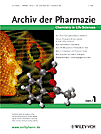
ARCHIV DER PHARMAZIE
Scope & Guideline
Exploring the Frontiers of Pharmacy Research
Introduction
Aims and Scopes
- Drug Discovery and Development:
The journal features studies on the design, synthesis, and biological evaluation of novel compounds, emphasizing their potential as therapeutic agents. - Pharmacological Evaluation:
Research includes in vitro and in vivo studies assessing the efficacy and safety of new drugs, including anticancer, antimicrobial, and anti-inflammatory agents. - Medicinal Chemistry:
Focus on the chemical synthesis and modification of compounds to improve their pharmacological properties, including structure-activity relationship (SAR) studies. - Natural Products and Phytochemistry:
The journal promotes research that investigates the medicinal properties of natural compounds and their derivatives, exploring their mechanisms of action. - Analytical Techniques:
Papers often employ advanced analytical methods, such as HPLC and mass spectrometry, to characterize compounds and assess their biological activities. - Innovative Therapeutic Strategies:
The journal explores novel therapeutic approaches, including drug repurposing, multi-target drug design, and the use of nanotechnology in drug delivery.
Trending and Emerging
- Green Chemistry and Sustainability:
There is a growing emphasis on environmentally friendly synthesis methods and the evaluation of the sustainability of pharmaceutical processes. - Nanotechnology in Drug Delivery:
Research exploring the use of nanocarriers for drug delivery systems has gained traction, particularly in enhancing the bioavailability and targeting of therapeutic agents. - Multi-Target Drug Design:
An increase in studies focusing on multi-target strategies for drug development indicates a shift towards more complex therapeutic solutions for diseases like cancer and infectious diseases. - Repurposing Existing Drugs:
The exploration of existing drugs for new therapeutic uses has become a prominent theme, aiming to expedite the drug development process and address urgent medical needs. - Bioinformatics and Computational Chemistry:
Papers utilizing computational approaches for drug design and analysis are on the rise, reflecting the integration of technology in pharmaceutical research. - Personalized Medicine:
There is an emerging focus on personalized medicine, with studies highlighting the need for tailored therapeutic strategies based on individual patient profiles.
Declining or Waning
- Traditional Medicinal Applications:
Research focusing solely on traditional uses of medicinal plants has decreased, likely due to the increasing emphasis on molecular mechanisms and pharmacological validation. - Single Target Drug Design:
There is a noticeable shift away from studies that focus exclusively on single-target drug design, as researchers are increasingly interested in multi-target approaches for enhanced therapeutic efficacy. - Basic Pharmacognosy Studies:
Basic studies on the identification and classification of medicinal plants have waned, as the field is moving towards more applied research with clear therapeutic implications. - Historical Reviews of Drug Development:
The publication of historical reviews detailing past drug development processes has diminished, replaced by more forward-looking studies that explore current trends and future directions.
Similar Journals

TROPICAL JOURNAL OF PHARMACEUTICAL RESEARCH
Championing open access to vital pharmaceutical knowledge.Tropical Journal of Pharmaceutical Research is an esteemed open-access platform dedicated to advancing the field of pharmaceutical sciences, published by the Pharmacotherapy Group in Nigeria. With an ISSN of 1596-5996 and open access established since 2002, this journal serves as a critical resource for researchers, professionals, and students seeking to disseminate and access high-quality research in both pharmaceutical science and pharmacology. Despite its ranking in the third quartile (Q3) for Pharmaceutical Science and the fourth quartile (Q4) in Pharmacology as of 2023, the journal continues to stand out with its commitment to fostering significant dialogue and innovation in the scientific community. Anchored at the University of Benin, Faculty of Pharmacy, the journal invites contributions that explore novel pharmaceutical research, clinical applications, and drug development, playing a vital role in addressing health challenges that are particularly relevant to tropical regions. Researchers can look forward to publishing their findings in a journal that not only promotes the sharing of knowledge but also enhances the scientific discourse within a rapidly evolving field.

RSC Medicinal Chemistry
Transforming Discoveries into Healing SolutionsRSC Medicinal Chemistry is a pivotal journal in the realm of medicinal chemistry, published by the esteemed Royal Society of Chemistry. With a focus on innovative research that intersects various disciplines such as biochemistry, drug discovery, pharmaceutical science, and organic chemistry, this journal serves as a vital resource for researchers, professionals, and students alike. Its impressive impact factor and notable rankings—positioning it within the Q1 and Q2 quartiles across critical categories—underscore its significance in advancing knowledge and fostering collaboration within the scientific community. RSC Medicinal Chemistry is dedicated to open access, ensuring that cutting-edge findings on drug design and therapeutic applications are freely available to enhance global research efforts. With a commitment to publication excellence from 2020 to 2024, it is a prominent platform where groundbreaking ideas meet practical implications, making it indispensable for anyone committed to the forefront of medicinal advances.
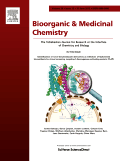
BIOORGANIC & MEDICINAL CHEMISTRY
Connecting Molecular Insights to Clinical ApplicationsBIOORGANIC & MEDICINAL CHEMISTRY, published by Pergamon-Elsevier Science Ltd, is a prominent journal in the fields of biochemical research and drug discovery, with an ISSN of 0968-0896 and an E-ISSN of 1464-3391. Established in 1993, it has garnered respect and recognition, evidenced by its categorization in various quartile ranks across 2023, including Q2 in Clinical Biochemistry and Pharmaceutical Science. It holds significant Scopus rankings, placing it in the 75th percentile in Pharmaceutical Science and 74th percentile in Organic Chemistry, highlighting its influential contributions to ongoing research and developments. This journal provides a platform for disseminating advancements in bioorganic and medicinal chemistry, focusing on innovative methodologies, therapeutic advancements, and molecular pharmacology. Although it does not follow an open-access model, it remains a key resource for researchers, professionals, and students aiming to stay at the forefront of scientific discovery in the UK and beyond. The journal’s commitment to enhancing knowledge within the biomedical community makes it an essential read for those passionate about this dynamic field.
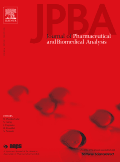
Journal of Pharmaceutical and Biomedical Analysis
Innovative insights for tomorrow's drug discovery.The Journal of Pharmaceutical and Biomedical Analysis, published by ELSEVIER and available in print and online formats, stands as a pivotal source of knowledge in the realms of Analytical Chemistry, Clinical Biochemistry, Drug Discovery, and Pharmaceutical Science. With an ISSN of 0731-7085 and an e-ISSN of 1873-264X, this journal is dedicated to publishing high-quality research that advances the understanding and development of analytical techniques in pharmaceuticals and biomedicine. The journal has earned a solid reputation, reflected in its Q2 category rankings across five distinct fields for 2023, and boasts impressive Scopus rankings, signaling its robust impact within the academic community. The Journal of Pharmaceutical and Biomedical Analysis serves as an essential resource for researchers, professionals, and students alike, providing actionable insights and fostering innovation that can directly influence future advancements in drug development and biomedical applications.
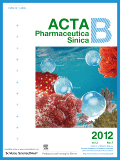
Acta Pharmaceutica Sinica B
Unlocking New Horizons in Pharmacology and ToxicologyActa Pharmaceutica Sinica B is a prestigious open access journal that has been setting the standard in the field of pharmacology, toxicology, and pharmaceutics since its establishment in 2011. Published by the Institute of Materia Medica, Chinese Academy of Medical Sciences, the journal serves as a vital platform for researchers, professionals, and students seeking to disseminate innovative findings in drug development, pharmaceutical sciences, and therapeutic applications. With an impressive impact factor reflecting its high academic quality, Acta Pharmaceutica Sinica B has achieved Q1 status in the category of Pharmacology, Toxicology and Pharmaceutics as of 2023, ranking #1 out of 80 journals in General Pharmacology. This journal not only focuses on the latest advancements in drug research and formulation but also emphasizes interdisciplinary approaches, fostering collaborations that span various scientific domains. The accessible nature of the journal, combined with its rigorous peer-review process, ensures that crucial insights and breakthroughs reach a global audience swiftly and effectively. For those looking to stay at the forefront of pharmaceutical research, Acta Pharmaceutica Sinica B is an indispensable resource.
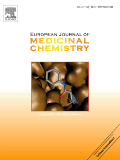
EUROPEAN JOURNAL OF MEDICINAL CHEMISTRY
Exploring New Horizons in Bioactive Compound Design.European Journal of Medicinal Chemistry, a premier publication by Elsevier France-Editions Scientifiques Médicales Elsevier, has been at the forefront of advancing medicinal chemistry since its inception in 1974. With an impressive impact factor and ranking in the Q1 quartile across multiple categories including Drug Discovery, Medicine (miscellaneous), Organic Chemistry, and Pharmacology, this journal delivers cutting-edge research and reviews that are vital for researchers and professionals in the field. The journal’s scope encompasses the design, synthesis, and evaluation of biological activity of bioactive compounds, making it a critical resource for those looking to innovate in drug development and therapeutic strategies. Although currently not open access, subscribers can benefit from its diverse range of high-quality articles, ensuring the dissemination of knowledge in the ever-evolving landscape of medicinal chemistry. The European Journal of Medicinal Chemistry continues to play a pivotal role in shaping the future of pharmacological research and its application, thus appealing to an audience dedicated to making impactful scientific contributions.

International Journal of Pharmaceutical Investigation
Driving Innovation in Drug Development and FormulationInternational Journal of Pharmaceutical Investigation, published by INPHARM ASSOC, PHCOG NET, is a premier platform dedicated to advancing the field of pharmaceutical sciences. With the ISSN 2230-973X and E-ISSN 2230-9713, this journal serves as a vital resource for researchers, professionals, and students focused on drug development, formulation, and efficacy. By fostering a rich discourse on innovative pharmaceutical practices and research breakthroughs, the journal plays a critical role in enhancing global health outcomes through groundbreaking scholarly work. The absence of open access allows for selective dissemination of high-quality content, promoting rigorous peer-review processes that uphold academic integrity. Featuring articles that span a diverse range of topics within pharmaceutical sciences, the International Journal of Pharmaceutical Investigation is committed to supporting the ongoing evolution of this dynamic field, making it an essential read for anyone engaged in pharmaceutical research and development.
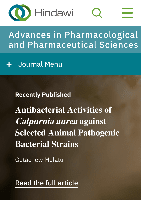
Advances in Pharmacological and Pharmaceutical Sciences
Exploring Innovations in Pharmaceutical Research.Advances in Pharmacological and Pharmaceutical Sciences is a premier open-access journal published by Hindawi Ltd. based in the United Kingdom. Established in 2020, the journal swiftly garnered attention for its commitment to disseminating high-quality research in the realms of pharmacology, toxicology, and pharmaceutical sciences. It holds a commendable impact with notable quartile rankings, including Q2 in both Organic Chemistry and Pharmacology, indicating its importance within these disciplines. By embracing an open-access model, the journal ensures that research findings are widely available, promoting increased visibility and collaboration among researchers, professionals, and students globally. With an ongoing convergence of insights projected through 2024, Advances in Pharmacological and Pharmaceutical Sciences aims to address critical issues and advancements in drug development and therapeutic practices, making it an invaluable resource for those at the forefront of scientific inquiry in pharmacology and related fields.
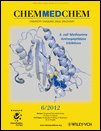
ChemMedChem
Pioneering insights for the next generation of pharmaceuticals.ChemMedChem is a leading international journal published by WILEY-V C H VERLAG GMBH in the United Kingdom, specializing in the interdisciplinary fields of medicinal chemistry and drug discovery. With a commendable impact factor that places it in the Q1 quartile for Organic Chemistry and among the Q2 ranks in several other key categories including Biochemistry, Molecular Medicine, and Pharmacology, ChemMedChem serves as a vital platform for the dissemination of innovative research and transformative insights in the development of pharmaceutical agents. Since its inception in 2006, this journal has been at the forefront of advancing knowledge that bridges the gap between fundamental research and practical applications in medicine, making it an essential resource for researchers, professionals, and students alike. Although it currently does not offer Open Access options, the journal ensures high-quality peer-reviewed content that engages its audience and fosters collaborative scientific discourse.

BIOORGANIC & MEDICINAL CHEMISTRY LETTERS
Transforming discoveries into therapeutic solutions.BIOORGANIC & MEDICINAL CHEMISTRY LETTERS, published by PERGAMON-ELSEVIER SCIENCE LTD, is a leading journal in the fields of biochemistry, drug discovery, and medicinal chemistry, designed to disseminate significant advances in these disciplines. Established in 1991, the journal spans various important categories, including Organic Chemistry and Pharmaceutical Science, with its 2023 Scimago Journal Rank placing it at Q2 in Organic Chemistry and Q3 in several other relevant fields. Though not an open-access publication, it provides invaluable insights into contemporary research and innovative methodologies, appealing to researchers, professionals, and students alike. The journal's commitment to quality and relevance makes it a vital resource for those aiming to stay at the forefront of bioorganic and medicinal chemistry developments. For more information, please visit the journal's website as it remains a critical platform for scholarly exchange, particularly for those engaged in interdisciplinary research.